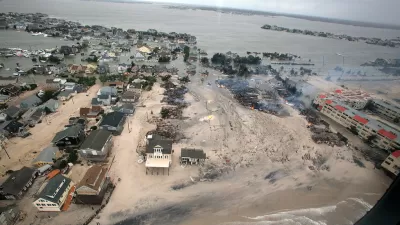In a worst case scenario, generated by a new study published in the Proceedings of the National Academy of Sciences of the United States of America, land home to 25 million Americans will be lost to rising seas as a result of climate change.

Chris Mooney shares news of a study that details the land on the coast of the United States that will be inundated by sea water as the effects of climate change become more and more cemented into the environment. "Future emissions will determine which areas we can continue to occupy or may have to abandon," according to the report.
Many U.S. cities are "committed to futures below sea level," if climate change continues unchecked. The critical number that drives the study's estimates: "For every one degree Celsius of warming, the scientists estimate that we should expect 2.3 meters of long-term, eventual sea-level rise, playing out over millennia."
Benjamin Strauss of Climate Central in Princeton, N.J. led the study, with co-authors Scott Kulp of Climate Central and Anders Levermann of the Potsdam Institute for Climate Impact Research in Germany.
So according to the study's calculations, if the world were to continue with business as usual and suffer the consequences of the sea level rise that would follow, "the current locations of over 26 million Americans’ homes might be inundated, and more than 1,500 U.S. cities and municipalities could find the areas where half of the residents live inundated." For those doing the quick math at home, that's more people than live in each of 48 states in the United States—all but California and Texas.
Climate Central has an interactive map that shows how the country's geography would change in various scenarios of increased temperatures and corresponding sea levels.
A similar study, released last year, targeted Anchorage, Seattle, and Detroit as prime real estate after the seas come for the country's current coastal communities.
FULL STORY: This is how rising seas will reshape the face of the United States

Alabama: Trump Terminates Settlements for Black Communities Harmed By Raw Sewage
Trump deemed the landmark civil rights agreement “illegal DEI and environmental justice policy.”

Study: Maui’s Plan to Convert Vacation Rentals to Long-Term Housing Could Cause Nearly $1 Billion Economic Loss
The plan would reduce visitor accommodation by 25% resulting in 1,900 jobs lost.

Planetizen Federal Action Tracker
A weekly monitor of how Trump’s orders and actions are impacting planners and planning in America.

Wind Energy on the Rise Despite Federal Policy Reversal
The Trump administration is revoking federal support for renewable energy, but demand for new projects continues unabated.

Passengers Flock to Caltrain After Electrification
The new electric trains are running faster and more reliably, leading to strong ridership growth on the Bay Area rail system.

Texas Churches Rally Behind ‘Yes in God’s Back Yard’ Legislation
Religious leaders want the state to reduce zoning regulations to streamline leasing church-owned land to housing developers.
Urban Design for Planners 1: Software Tools
This six-course series explores essential urban design concepts using open source software and equips planners with the tools they need to participate fully in the urban design process.
Planning for Universal Design
Learn the tools for implementing Universal Design in planning regulations.
Caltrans
Smith Gee Studio
Institute for Housing and Urban Development Studies (IHS)
City of Grandview
Harvard GSD Executive Education
Toledo-Lucas County Plan Commissions
Salt Lake City
NYU Wagner Graduate School of Public Service





























